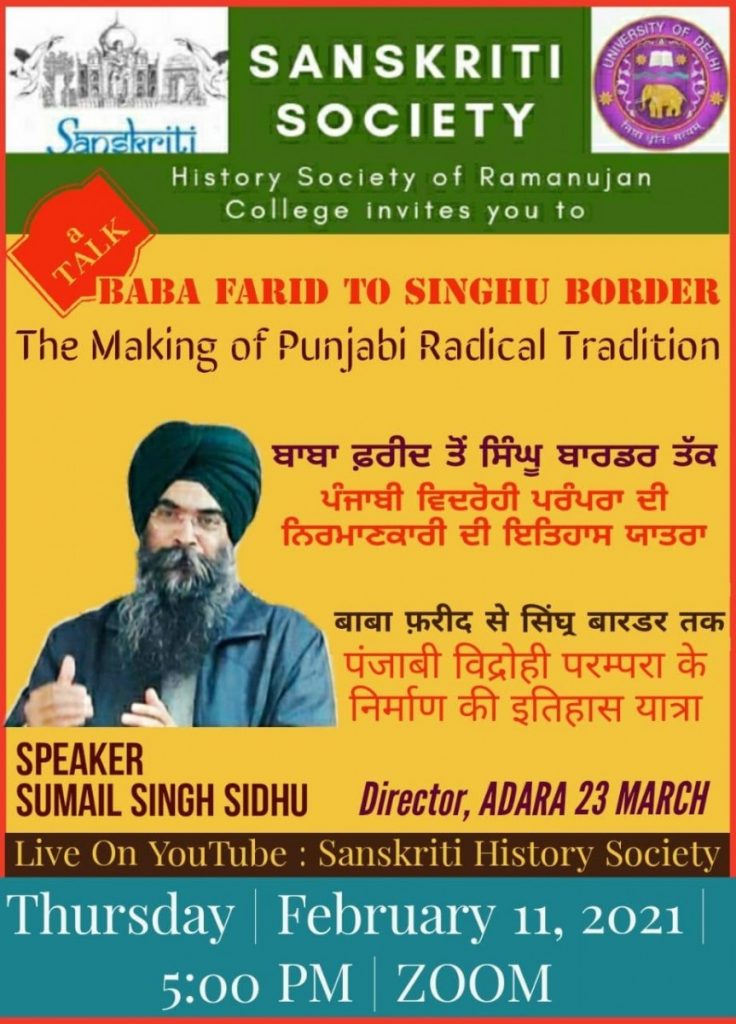New Delhi: A scheduled online talk at Delhi University’s Ramanujan College was cancelled minutes before it was to take place – allegedly because the college administration was uncomfortable with the mention of the farmers’ protests in the title.
Scholar Sumail Singh Sidhu was informed that his talk titled ‘Baba Farid to Singhu Border’ would not be taking place, five minutes before it was supposed to.
“The understanding that I got was that the title of the talk did not go well with the administration, because it indicates that the talk would cover the ongoing farmers’ protest at Delhi’s borders,” Sidhu told The Wire.
However, Sidhu said that the talk – organised by the college’s history society, Sanskriti – would have largely been on the history and evolution of Punjabi language and how it lent itself to Punjabi radical tradition.
“To raise vernacular and everyday Punjabi language to this level of conceptualisation has been a great radical task. It has empowered the language. The talk was supposed to be an academic exercise for students of history as well as others who were interested in it,” Sidhu told The Wire over the phone.

Both students and teachers, who had been looking forward to attending the talk, were disappointed with the cancellation, he said. “Talking about the cultural history is no crime. And such a move should not be taken lying down,” he added.
The poster released by Sanskriti for the talk says that the programme would be held over Zoom and would stream live on YouTube. But Ramanujan College principal S.P. Agarwal said that the group was facing technical difficulties, because of which the event had to be cancelled.
“The technical wing of the organising team will be able to tell. They have organised it and they only cancelled it; I don’t know much about it,” he told The Wire.
Sidhu disagrees with this explanation. “There were many people who were just waiting to join the call, they didn’t get wind of any technical difficulties. People had taken off from work to attend the day, including a couple from the UK . Students were excited for the talk and I had also prepared for weeks,” he said.
The reason Singhu border was part of the title of the talk, Sidhu said, is because it would have been easier for students to understand Punjabi history through this ongoing popular movement.
“I was going to talk about the history of the radical imaginings of Punjab. Memories of that history are harnessed by popular movements and especially during ongoing protests. But why should Singhu border not be used in academics? It is not hidden, it is out there, in the open. People are reporting on it every day. The rightwing lobby have pressurised the principal into cancelling it. The organisers kept arguing with the principal trying to let it actually happen, and I felt really bad for the students. Their spirits had been brought down,” he said.
Also read | Calls for Netflix Ban: The Perils of India’s Own ‘Cancel Culture’
This is an attack on academic freedom, Sidhu added.
He also criticised Narendra Modi’s ‘Atmanirbhar Bharat’ effort, saying that it will be impossible to achieve self reliace without academic freedom. “Today, farmers are being called Khalistani for protesting against the government’s policy and sadly, I think I am also being seen simply as a man with a turban and beard,” he said.
“Nobody should be able to dictate to us what to say, when to say, who to talk about and where to say what,” he stressed.
Sidhu said such harassment is not new for him. He said he lost his job as assistant professor of Sri Guru Tegh Bahadur Khalsa College in 2011, after presenting a paper on and titled ‘Situating Banda Bahadur in Sikh Studies.’

Statue of Baba Banda Bahadur the Sikh warrior who won the battle at Chappar Chiri. Photo: Wikipedia/CC BY-SA 4.0
“Banda Bahadur is a revered figure but his position in scholarly books is not that of a hero or that of a leader of a resistance movement. He is, in fact, considered to be quite the deviant character….and my paper was about this,” Sidhu said.
“It was assumed that I had hurt people’s sentiments through this paper. However, my only point was to open this topic up to academic dialogue,” he said.
Also read: In 2014, the Sikh Flag Flew at the Red Fort – And the Hindu Rightwing Had No Complaints
He had then written an open letter to the college principal, Dr. Jaswinder Singh, saying:
“In the end, the martyrdom of Sri Guru Tegh Bahadur Sahib is inseparable from the question of freedom of thought, freedom of expression and to speak truth to power. Adhering to this praxis of intellectual courage is the only way to contemplate new horizons for this college. I am committed to express my ideas in the spirit of ‘nirbhau nirvair’ (without fear and prejudice) following the example of Sri Guru Tegh Bahadur Sahib. Whereas, stemming from an acute sense of intellectual cowardice and eroding legitimacy, you are employing coercion and authoritarianism. You have time, still, to make a choice – do you stand with Guru Tegh Bahadur or his power-drunk executioners?
The letter further read, “Only by making these brave ethical choices can you hope to attain your moral fibre and not through censorship, coercion or injustice!”
Sidhu says that the nature of academic research is controversial in nature as it involves “disputing established facts” through dissent and research. “Without this, there will be no innovation in research,” he added.
